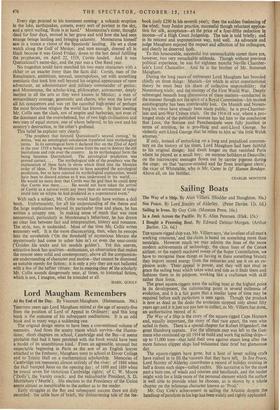Lord Maugham Remembers
At the End of the Day. By Viscount Maugham. (Heinemann. 30s.) THIRTEEN years ago Lord Maugham retired at the age of seventy-five from the position of Lord of Appeal in Ordinary; and this long book is the outcome of his subsequent meditations. It is an odd book and in many ways a saddening one.
The original design seems to have been a conventional volume of memoirs. And from the scanty traces which survive—the illustra- tions; short chapters on school, Cambridge and the Bar—it seems probable that had it been persisted with the book would have been a model of its unambitious kind. From an agreeable, unusual but respectable beginning in Paris as the son of an English lawyer attached to the Embassy,. Maugham went to school at Dover College and to Trinity Hall on a mathematical scholarship. Memories of Cambridge are memories almost entirely of the river: of 1886 when the Hall bumped Jesus on the opening day; of 1888 and 1889 when he rowed seven for victorious Cambridge eights; of C. W. Moore ('Dolly')'; the Varsity coach; and the redoubtable President, S. D. Muttlebury (`Muttle'). His election to the Presidency of the Union seems almost as.inexplicable to the author as to the reader.
Early struggles at the Bar and subsequent success there are duly recorded: the table bare of briefs, the disheartening tale of the fee- book (only £290 in his seventh year); then the sudden freshening of the wind; busy Junior practice, successful though reluctant applica• Lion for silk, acceptance—a% the price of a four-fifths reduction in income—of a High Court Judgeship. The tale is told briefly; and in its reticent and unpretentious way, told well. As advocate and judge Maugham enjoyed the respect and affection of his colleagues, and clearly he deserved both.
To this honourable, successful but unremarkable career there are, however, two very remarkable addenda. Though without previous political experience, he was for eighteen months Neville Chamber- lain's Lord Chancellor. And he is the brother of Mr. Somerset Maugham.
During the long years of retirement Lord Maugham has brooded chiefly on three things: Munich—for which in strict constitutional theory he must bear his share of collective responsibility; the Nuremburg trials; and the strategy of the First World War. Deeply submerged beneath long discussions of these matters—conducted in the manner though not the spirit of a Royal Commission—his modest autobiography has been irretrievably lost. On Munich and Nurem- burg his views have already been made public; he is pro-Chamber- lain and anti-War Crimes trials. On the 1914-18 war, where, a pro-- longed study of the published sources has led him to the conclusion that Loos, the Somme and Passchendaele were fully justified in terms of attrition, he is pro-Haig and anti-Lloyd George. So violently anti-Lloyd George that he refers to him as 'the little Welsh attorney.'
If only, instead of embarking on a long and prejudiced commen- tary on the history of his times, Lord Maugham had been faithful to his original design; had dwelt longer on that vanished Paris where he played as a small boy; on summer holidays at Deauville; on the microscopic messages flown out by carrier pigeons during the siege; on that `narrow-minded and far from intelligent cleric', the vicar of Whitstable, who is Mr. Carey in Of Human Bondage. Above all, on his brother.
CHARLES MONTEITH


































 Previous page
Previous page